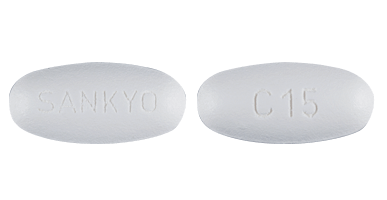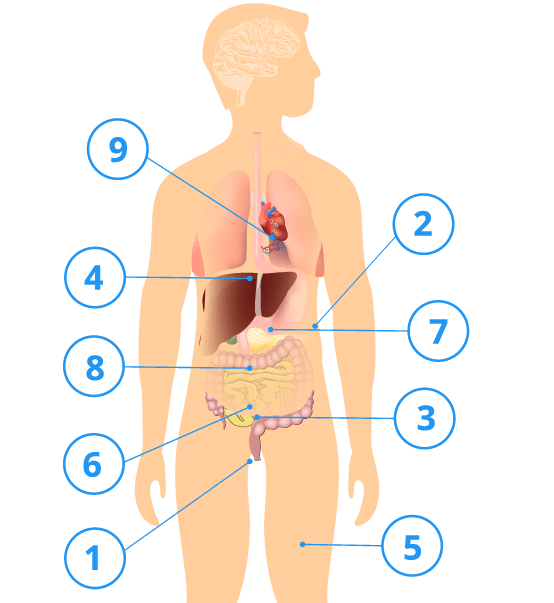Benicar Side Effects
The most common Benicar (olmesartan) side effect is dizziness. Rare instances of the condition sprue-like enteropathy can cause gastrointestinal upset, diarrhea, weight loss and dehydration. Olmesartan is also linked to fetal toxicity and is not recommended for use during pregnancy.
Article Continues Below

Board-certified physicians medically review Drugwatch.com content to ensure its accuracy and quality.
Drugwatch.com partners with Physicians’ Review Network Inc. to enlist specialists. PRN is a nationally recognized leader in providing independent medical reviews.
Reviewer specialties include internal medicine, gastroenterology, oncology, orthopedic surgery and psychiatry.
Drugwatch.com has been empowering patients for more than a decade
Drugwatch.com has provided reliable, trusted information about medications, medical devices and general health since 2008. We’ve also connected thousands of people injured by drugs and medical devices with top-ranked national law firms to take action against negligent corporations.
Our team includes experienced medical writers, award-winning journalists, researchers and certified medical and legal experts. Drugwatch.com is HONCode (Health On the Net Foundation) certified. This means the high-quality information we provide comes from credible sources, such as peer-reviewed medical journals and expert interviews.
The information on Drugwatch.com has been medically and legally reviewed by more than 30 expert contributors, including doctors, pharmacists, lawyers, patient advocates and other health care professionals. Our writers are members of professional associations, including American Medical Writers Association, American Bar Association, The Alliance of Professional Health Advocates and International Society for Medical Publication Professionals.
About Drugwatch.com
- Assisting patients and their families since 2008.
- Helped more than 12,000 people find legal help.
- A+ rating from the Better Business Bureau.
- 5-star reviewed medical and legal information site.
Testimonials
"Drugwatch opened my eyes to the realities of big pharmacy. Having a family member with major depression and anxiety, I was looking for information on her medications. I found information that was very helpful, that her psychiatrist never told her."
- Common Side Effects
- Dizziness, upset stomach, low blood pressure, diarrhea, pain and swelling
- Serious Side Effects
- Blood in your urine, bleeding, severe diarrhea, weakness, tingling sensation, kidney problems and sprue-like enteropathy
- Boxed Warning
- Benicar contains a boxed warning for fetal toxicity
Most Recent Benicar Side Effects Information
As of September 2024, the most common Benicar side effects reported to the U.S. Food & Drug Administration were gastrointestinal disorders. These included sprue-like enteropathy, which causes weight loss and chronic diarrhea and gastroesophageal reflux disease (GERD). Weight loss, acute kidney injury and dizziness were also frequently noted.
- Sprue-Like Enteropathy: 34.09%
- Gastroesophageal Reflux Disease: 19.11%
- Acute Kidney Injury: 14%
- All Other Side Effects: 32.8%
FAERS data may not accurately represent a drug’s safety profile. It can include adverse effects that may be incidental to a medication. Therefore, it is important to discuss possible side effects and drug interactions with a knowledgeable health care provider before taking Benicar.
| FDA Adverse Event Reports for Benicar Side Effects | |
|---|---|
| Total cases reported | 10,968 |
| Serious cases (including deaths) | 7,314 |
| Deaths | 184 |
Disclaimer: Reports sent to the FDA don’t necessarily mean the drug caused an adverse event. Consult a health care professional before stopping or changing medication.
Common Benicar Side Effects
Packaging for Benicar indicates that dizziness is the most common side effect. In clinical trials, side effects were similar in kids and adults.
However, in a 2017 research study of several blood pressure medications, participants reported headaches, respiratory infections and dizziness as the most frequent olmesartan side effects. Olmesartan is the active ingredient in Benicar.
- Headache (7.2%)
- Upper respiratory infections (4.9%)
- Dizziness (2.8%)
The most common Benicar side effects are generally mild. Patients can often manage them at home with over-the-counter treatments. However, some symptoms, like upper respiratory infections, may need medicine or treatment.
Most side effects will decrease or go away completely as your body adjusts to the medication. Other side effects, such as kidney dysfunction, may decrease or go away when you discontinue olmesartan. Sprue-like enteropathy can occur months or years after taking Benicar.
Be sure to tell your doctor if any side effects last for more than several days or if they become severe.
Serious Benicar Side Effects
Benicar can cause several serious side effects, including impaired kidney function, anaphylaxis, swelling and sprue-like enteropathy. The drug has a boxed warning for severe risk to fetuses in pregnant patients.
- Acute kidney failure
- Blood in urine
- Chest pain
- Elevated potassium levels
- Fainting
- Fetal toxicity
- Kidney failure
- Severe allergic reaction
- Sprue-like enteropathy
Olmesartan may cause dehydration and changes in body salt levels due to one of its ingredients: thiazide diuretic (water pill). Low sodium levels and dehydration can contribute to low blood pressure. Additionally, some patients may experience electrolyte imbalances, such as elevated potassium levels.
There is also a risk of severe allergic reaction leading to anaphylaxis. Do not take Benicar if you are allergic to olmesartan or any of its other ingredients. You could have a serious and potentially life-threatening reaction. Seek medical help right away if you notice symptoms of anaphylaxis. These include wheezing, difficulty breathing, hives or swelling of your face, throat, or mouth.
When To Seek Medical Attention
Report any unusual side effects, such as prolonged diarrhea, weight loss or blood in your urine, to a health care professional.
Additionally, if side effects are severe or last for more than a few days, speak to a health care provider for advice.
Fetal Toxicity Boxed Warning
Benicar is toxic to developing fetuses and can result in fetal abnormalities or death. Potential fetal abnormalities include skull abnormalities, low blood pressure and kidney failure. Some babies may be unable to produce and pass urine. These effects are most common during the second and third trimester of pregnancy.
A boxed warning on Benicar packaging warns patients of this risk. You should not take Benicar during pregnancy. If you become pregnant while taking it, notify your doctor immediately.
Sprue-Like Enteropathy
Benicar can cause severe intestinal disorders, including sprue-like enteropathy, which can cause permanent damage to the intestines. This condition is characterized by severe diarrhea, dehydration and weight loss. Symptoms may appear shortly after starting treatment, but they can sometimes take years to develop.
“The enteropathy may develop months to years after starting olmesartan, and sometimes requires hospitalization.”
Signs and symptoms of sprue-like enteropathy

- Severe, chronic diarrhea
- Substantial weight loss
- Malabsorption
- Abdominal pain
- Fatigue
- Bloating
- Nausea
- Vomiting
- Anemia
Patients filed numerous lawsuits over damages associated with sprue-like enteropathy. The advocacy group Public Citizen also petitioned the FDA to withdraw Benicar from the market due to its harmful gastrointestinal effects. However, the FDA found that existing product warnings were sufficient. Given the lack of new evidence and the tremendous benefit millions of patients get from Benicar, the FDA did not withdraw Benicar.
Case Study: Man Experiences Olmesartan-Induced Enteropathy
A study published in 2021 in the journal Cureus reported that a 54-year-old man who was taking Benicar had persistent diarrhea. This caused him to lose 45 pounds in just one month. He went to the hospital multiple times, but none of the usual tests showed why he was so sick.
Diagnosis Challenge
At first, the patient’s symptoms puzzled the doctors. They couldn’t find the usual reasons for his diarrhea, like infections or celiac disease. However, after ruling out common causes, the doctors concluded that olmesartan might be the cause of his symptoms.
This patient had the rare side effect known as olmesartan-induced enteropathy. It causes ongoing damage, irritation and inflammation in the small intestine.
Olmesartan-induced enteropathy can be hard to diagnose because its symptoms are similar to other gastrointestinal disorders.
Patient Outcome
Once doctors stopped the man’s olmesartan treatment, his diarrhea improved significantly, and his health stabilized. Within weeks of stopping Benicar, he experienced weight gain and regular bowel movements.
Benicar Alternatives
Benicar belongs to the angiotensin receptor-blocking class of blood pressure drugs. This type of drug is usually effective for patients with kidney disease, heart failure or high cardiovascular risks.
A 2024 comparison of six drugs from this class published in the International Journal of Clinical Pharmacy showed that olmesartan was highly effective and the best tolerated. However, it’s only one of several drug classes that are commonly used to treat high blood pressure.
- Angiotensin-converting enzyme inhibitors
- Irbesartan (Avapro), Losartan (Cozaar), Valsartan (Diovan)
- Calcium channel blockers
- Amlodipine (Norvasc), Felodipine (Plendil), Diltiazem (Tiazac)
- Thiazide-type diuretics
- Chlorothiazide Systemic (Diuril), Hydrochlorothiazide Systemic (Aquazide H), Metolazone Systemic (Zaroxolyn)
Angiotensin-converting enzyme inhibitors, also known as ACE, stop certain enzymes in your body from creating angiotensin 2. This substance narrows blood vessels and also releases hormones that raise blood pressure. Most ACE inhibitors will have similar side effects to Benicar.
Calcium channel blockers stop calcium from getting into your heart and artery cells. Having less calcium in them can help blood vessels stay open. For Black people, this option generally works best compared to other blood pressure medications. Some side effects include constipation, swelling, fatigue and headache.
Thiazide diuretics, which is one of Benicar’s ingredients, are often the first line of treatment for high blood pressure. If a diuretic alone is ineffective, your provider may prescribe them in combination with other treatments. They can also treat some kidney conditions, such as kidney stones.
Diuretics, also called water pills, work by reducing fluid build-up in the body. Reducing excess fluid can help decrease blood pressure. Side effects of diuretics include losing too much potassium or sodium and urinating more often. In rare cases, they may cause dehydration and gout.
Because one of the ingredients in Benicar is a thiazide diuretic, some of their side effects overlap.
There are many alternatives if you decide that Benicar is not the right choice to treat your hypertension. Talk to your doctor about other classes of blood pressure medication that might be a better fit for your medical history and lifestyle.
Editor Lindsay Donaldson contributed to this article.
Calling this number connects you with a Drugwatch.com representative. We will direct you to one of our trusted legal partners for a free case review.
Drugwatch.com's trusted legal partners support the organization's mission to keep people safe from dangerous drugs and medical devices. For more information, visit our partners page.


